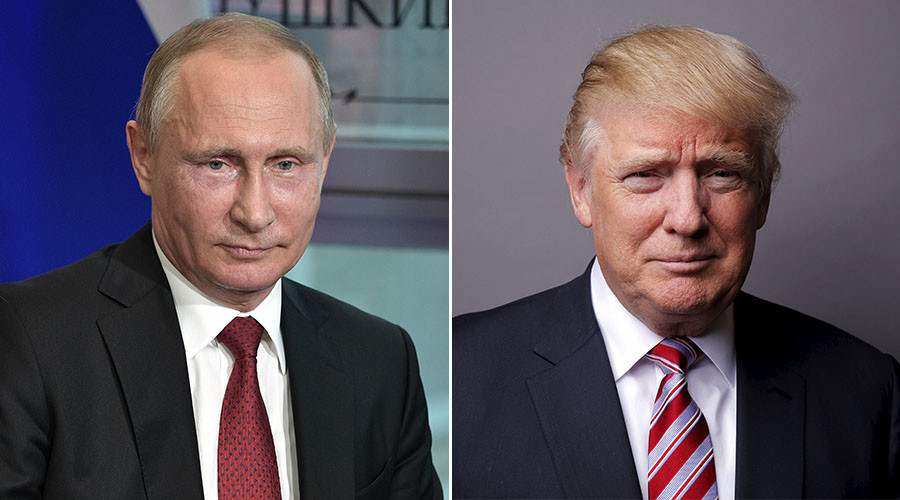by Robert E. Hunter
When Donald Trump and Vladimir Putin meet in Hamburg on the margins of the July 7-8 G20 summit, they need to begin a US-Russian strategic dialogue, like that between Washington and Moscow in all but the worst periods of the Cold War. This is essential to begin moving, if at all possible, beyond the current, high-risk confrontation. But don’t expect it to happen because U.S. domestic politics make it virtually impossible. Many Democrats and most of the mainstream media would pillory President Trump for even proposing it.
Given the risks and stakes, the US and Russia must learn to coexist in important areas of the globe, notably Europe and the Middle East. As President George H.W. Bush foresaw when he set the goal of creating a “Europe whole and free and at peace,” a resurgent Russia could not forever be kept down. Nor could the US continue indefinitely to set the rules for the post-Cold War world. By the same token, Putin cannot keep pressing Russia’s ambitions without generating continued, even crippling, limitations on its economic and political dealings with the outside world.
The current imbroglio began when Putin seized Crimea in February 2014, followed by Russian-supported aggression elsewhere in Ukraine. That conflict shows no signs of abating. Meanwhile, risks mount as Russia exerts further pressures on other Central European states, and as the West, including NATO and the European Union, pushes back. Further, with Russia now engaged more deeply in the Middle East, especially Syria, there are dangers of a direct clash between the US and Russian militaries. Even if it happened by accident, the implications would be ominous.
There is thus compelling need for Washington and Moscow to reopen the full range of direct channels of communication, including deconfliction of their respective military operations. But much more is required. This includes exploring ways of moving back toward Bush’s vision, in which all European countries would gain a stake in a common security structure and everyone’s sovereignty and independence would be protected.
Yet even if Trump and Putin were so disposed, working on issues dividing America and Russia is only part of the problem. Equally challenging is whether Trump will be able to display any flexibility in dealing with Putin, lest he be accused in the United States of malfeasance or worse. The entire corpus of US-Russian relations is now held hostage by US domestic politics, focusing on Russian interference in the 2016 US presidential election (however marginal its impact on the results), the history of Trump’s relations with Russia, possible ties between Russian oligarchs and Trump’s associates (including son-in-law Jared Kushner), and indiscretions involving Trump appointees, notably his first national security advisor, Lt. Gen. Michael Flynn.
This is heady stuff. Whether it will be enough to drive Trump from office, perhaps through proof of obstruction of justice or some other “high crimes and misdemeanors” that meet the constitutional test for impeachment, can only be guessed at now. But it is already clear that the president’s hands will be tied in dealing with Russia on any matters of serious substance, even involving core US interests.
Under the best of circumstances, it would not be easy to find a way past the current confrontation to bring Russia into the community of nations so that it might meet its legitimate requirements as well as respect those of its neighbors. Certainly, no one gains by rising tensions, increasing risks over Syria and elsewhere in the Near East, and the drift toward a new Cold War. To his credit, Trump has understood this as well as did Barack Obama. At least the possibility that Putin would agree to “rules of the road,” respecting both Western and Russian interests, needs to be tested.
But American domestic politics make it virtually impossible for Trump to use his meeting with Putin to try establishing a US-Russian strategic dialogue. Whatever the facts prove to be, many die-hard Hillary Clinton Democrats still see the Russia factor, rather than an inadequate political campaign, as having produced her electoral defeat, and it is proving to be the mainstream media’s best cudgel to try bringing down the Trump presidency.
Playing this uniquely American domestic drama to the end now seems unavoidable. But the potential costs to US interests and those of its allies and partners cannot be ignored. As difficult as it would be to achieve in Washington’s current fever, it is profoundly in the US interest to cut Trump some slack when he meets with Putin in Hamburg.






Sorry but this makes ZERO sense: ‘ Certainly, no one gains by rising tensions, increasing risks over Syria and elsewhere in the Near East, and the drift toward a new Cold War. To his credit, Trump has understood this as well as did Barack Obama. At least the possibility that Putin would agree to “rules of the road,” respecting both Western and Russian interests, needs to be tested.’
Trump promotes himself as a strong man, fighter, one who never apololgizes or backs down. He escalates tension just to be paid attention to. He states he has no ideology and is known to take on the viewpoints of the last person he spoke with. If he feels slighted in the least he and others give him permission to hit back 10x worse. He rises tension constantly because ‘iit’s good press’.
On the other hand Putin is a spy master who knows that trump is an easy mark for flattery and I personally believe he’s been a vehicle for real estate money laundrying. Putin has no interests in ‘western’ democracy and the effectiveness of getting trump elected has empowered him to destabilise our United States. trump and putin are no match.